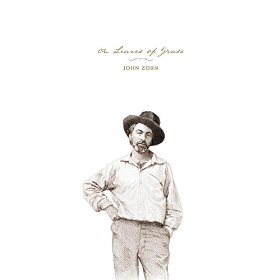This is the third release from the Nova Express quartet – John Medeski on piano, Kenny Wollesen on vibes, Trevor Dunn on bass and Joey Baron on drums – playing music composed, arranged and conducted by John Zorn. Whilst the first album, Nova Express, took inspiration from the writings of William Burroughs, and the second, Dreamachines, from the stroboscopic flicker device invented by Brion Gysin and Burroughs, the third time around, the music draws its creative spark from Walt Whitman’s work of humanist, mystical poetry Leaves Of Grass. Like the albums that preceded it, On Leaves Of Grass is housed in the kind of beautiful, inventive packaging that Zorn’s exclusive designer Heung-Heung Chin excels in. Dreamachines had the best packaging of any 2013 release that I was aware of – a thin white cardboard slip case comprising the cut-out shapes of the dreamachine cylinder, sat atop of a fold out case decorated with Gysin’s calligraphic paintings and an inner sleeve depicting a cut-up photograph of Gysin and Burroughs’ faces.
On Leaves Of Grass aims for a subtler effect, more suitable to the source of its inspiration – Whitman in his mid-thirties from the engraving that served as the original frontispiece for the 1855 edition of Leaves, appearing on the cover, and the classic image of the white-bearded poet looking as old as father time from three decades later inside, bookending the many years he spent revising the work. Although the lineup has remained constant over the three releases and the music stayed true to its originally established chamber music/cocktail jazz/minimalist axis, each album has aptly reflected the source of its inspiration. Hence Nova Express contained more jarring, discontinuous time-changing compositions in keeping with Burroughs cut-up method, and Dreamachines more hypnotic, trance-inducing suites as suggested by the device itself. On Leaves Of Grass aims instead for a more epic and lyrical feel, each of the tracks taking their names from poems contained within the collection.
For anyone unaware of the gentler side of Zorn’s music, as best represented by the album The Gift, or the four albums by his Dreamers project, the restraint and strength of melody showcased on this recording may come of something of a shock. The stellar level of musicianship displayed across Zorn’s often genre-defying works, however, is always a given constant, and there are some breathtakingly beautiful moments here. Baron, Dunn and Wollesen all spent time in Zorn’s seminal Masada outfit, as well as many other projects, whilst John Medeski is best known for his avant-jazz-funk jam band Medeski Martin & Wood. The gorgeous, ringing sound of Wollesen’s vibes combined with the fluidity and lightness of Medeski’s piano playing are like the resonant peal of heavenly bells, whilst Baron and Dunn effortlessly infer a serene yet exponentially expanding sense of space in the wonderfully titled ‘Whispers Of Heavenly Death.’ It’s an intensely beautiful piece of music that has an amazing, uplifting effect of the kind I only usually associate with the works of Steve Reich. Following that, ‘Song At Sunset’ doesn’t do itself any favours by being one of few instances on this recording of the band’s sound straying a little too far into the potentially bland region of the easy-listening aspect of their musical formula.
Admittedly, it’s sometimes a fine line this band draws between the transcendent and the music heard in the elevator that one takes to get to the top floor, and for some listeners a lot of these tunes may well fall too much into that category. As far as I’m concerned, Zorn’s multifaceted musical output is an essential part of his appeal as an artist and this is simply one of the more sublime strings to his bow. Besides, Zorn’s always had something of the alchemist about him, seeking to transform base materials into gold, and with these musicians on board you can forget initial appearances – things are never that straightforward. ‘Portals’ is a jarringly kinetic, quicksilver fast face-off between piano and vibes that only falls into a groove for a brief period in the middle of its otherwise chaotic four minutes. ‘Sea Drift’ sets up an oceanic soundscape so initially becalming that it almost lulls the listener to sleep, before climbing to an irresistible crescendo of drums and piano. ‘Mystic Cyphers’ brings another Zorn confederate and longstanding presence on the New York downtown scene, Ikue Mori, into the equation, adding subtle electronic flourishes to an essentially abstract piece. The album closes as strongly as it began with ‘America,’ an epic fourteen-minute track that encapsulates all that has preceded it with a hypnotic and easy grace. Taken on its own merits, this is an accessible release that reveals surprising depths beneath its surface subtlety with repeated listening. Seen within the greater context of Zorn’s overall canon, it further reinforces his position as one of the most diverse and prolific composers working today.
<div class="fb-comments" data-href="http://thequietus.com/articles/16084-john-zorn-on-leaves-of-grass” data-width="550">


